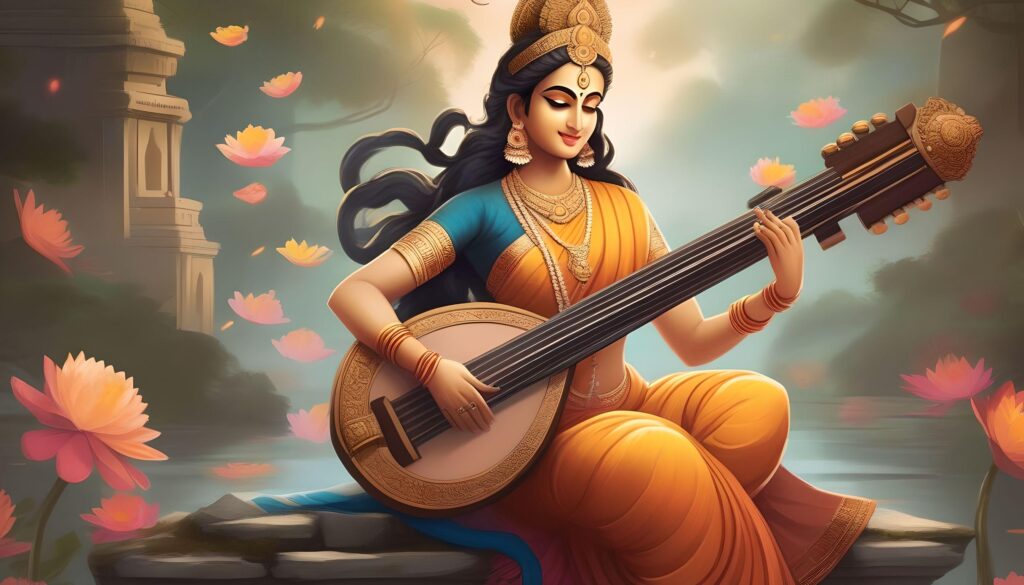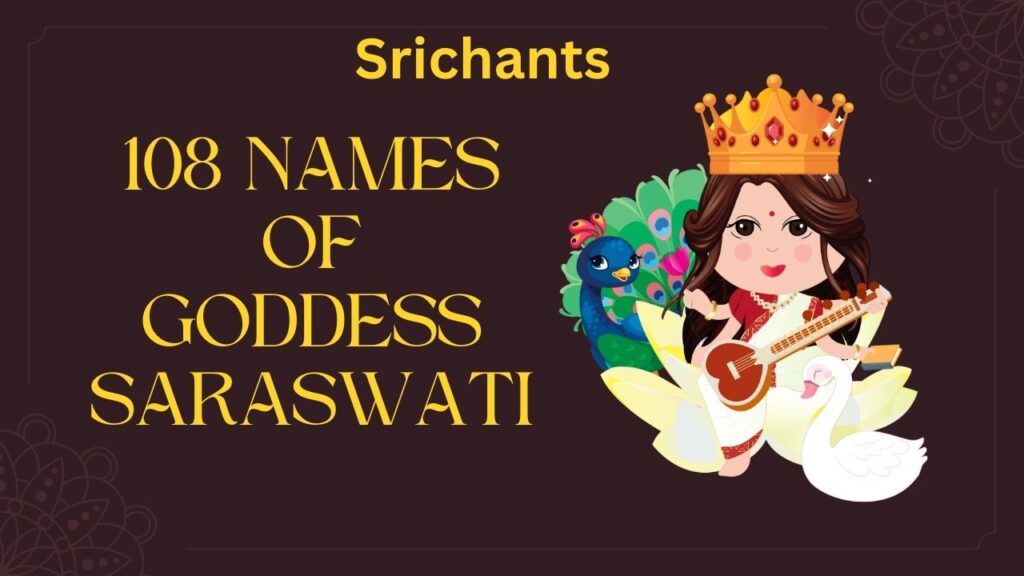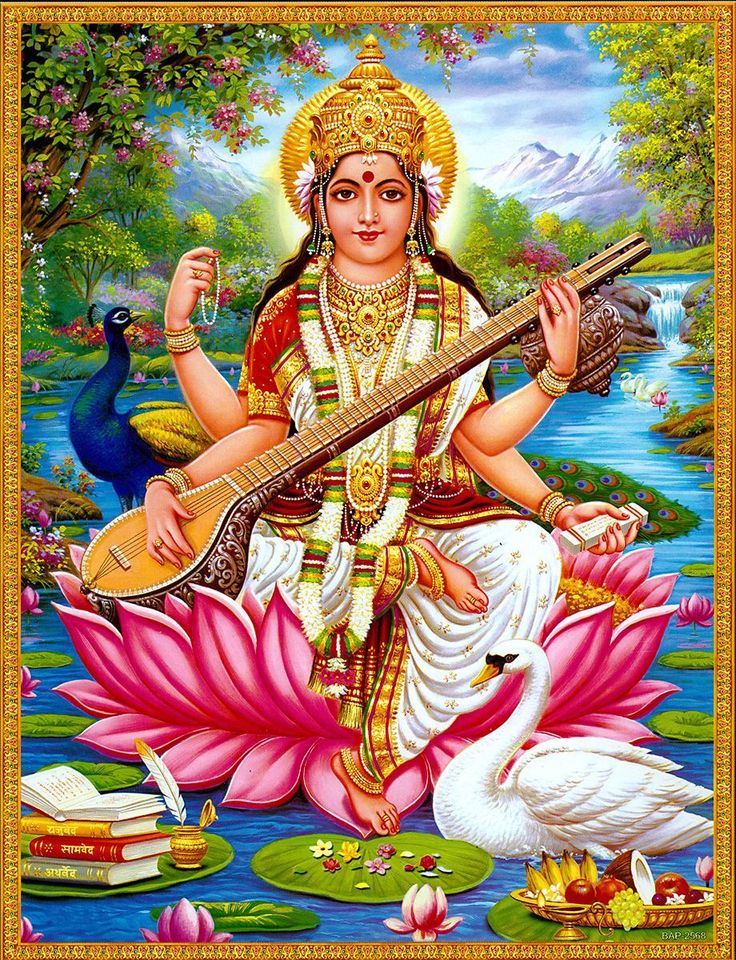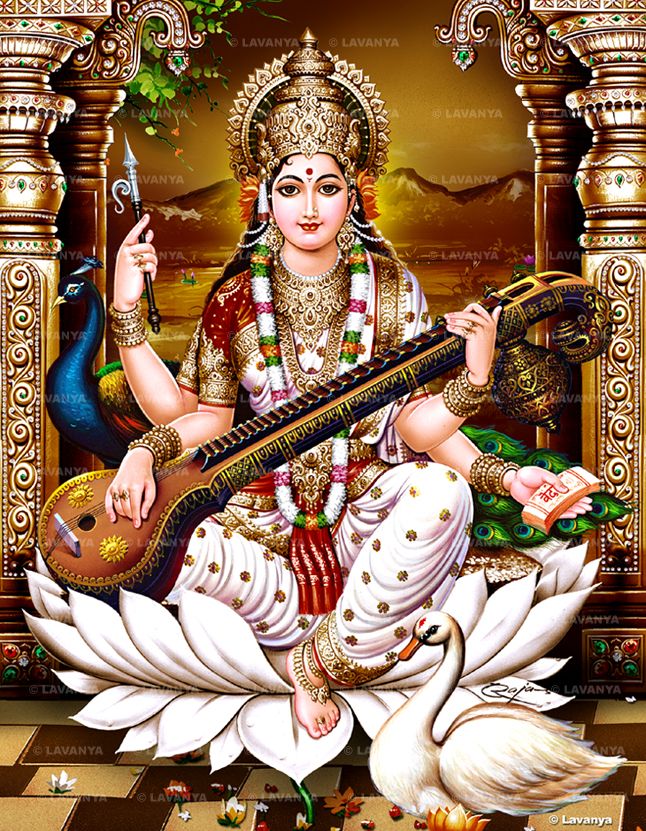Maa Saraswati: Role in Indian Mythology
Introduction
Among the great pantheon of Hindu gods, Saraswati is one of the most highly regarded figures with unmatched importance. Her influence permeates every element of the Indian spiritual and intellectual terrain as the goddess of knowledge, wisdom, arts, and culture. By means of an in-depth investigation of the mythological stories around Saraswati, we expose the depth and nuance of her divine persona, her complex interactions with other celestial beings, and the great influence she has had on the spiritual and cultural development of the Indian subcontinent.
Birth and Emergence of Saraswati
Hindu scriptures hold that turmoil and anarchy characterized the beginning of the universe’s formation. Seeking to give this primal anarchy form and organization, Brahma, the almighty creator, Understanding he needed knowledge and wisdom to direct his artistic activities, Brahma called forth the goddess Saraswati to represent enlightenment. Rising from Brahma’s own mouth, Saraswati’s entry marked the beginning of a new age, bringing in the organization and harmonic resonance of the celestial bodies, the creation of the seasons, and the birth of the basic elements shaping the cosmos.
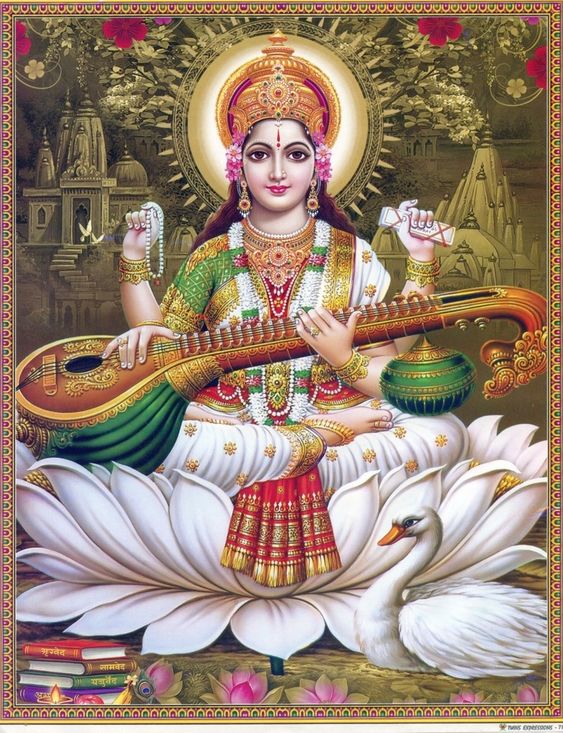
Saraswati’s several roles and qualities
Saraswati’s divine character is layered several times and involves a wide range of obligations and qualities. Respected as the patron of education, learning, and the arts, the goddess of wisdom is also Her four arms represent the four Vedas, the hallowed books upon which Hindu philosophy and spirituality are built. She represents the mastery of prose, poetry, and music, respectively, in her hands the holy books, a rosary of crystal beads, and a veena—a stringed musical instrument—that reflects each.
Saraswati’s relationship with the swan, a bird known for its sense of taste and separation of the pure from the impure, emphasizes even more her function as the living example of discriminating wisdom. Her taste for white, which stands for purity and heavenly illumination, is evidence of her rejection of the earthly in favor of the search of greater knowledge and spiritual transcendence.
Brahma and Saraswati’s Curse: Intervention
The legendary tales about Saraswati also explore the intricate relationship between the goddess and her father, Brahma, the universe’s creator. Driven by his obsession with his own daughter Saraswati, Brahma pursued her assiduously, much to the goddess’s dismay. With only two main temples dedicated to Brahma in India, Saraswati cursed him, predicting that he would not be generally adored or worshipped, a prophecy that has mostly come to pass driven by Brahma’s uncontrolled passion.
Still, Saraswati’s function as the living example of knowledge and wisdom did not stop there. Saraswati stepped in to expose Brahma the road of purification and atonement when his deeds threatened to upset the cosmic order. Brahma finally reconciled with the goddess after he performed a holy yagna (fire sacrifice) under her direction, therefore purging himself of his immoral impulses.
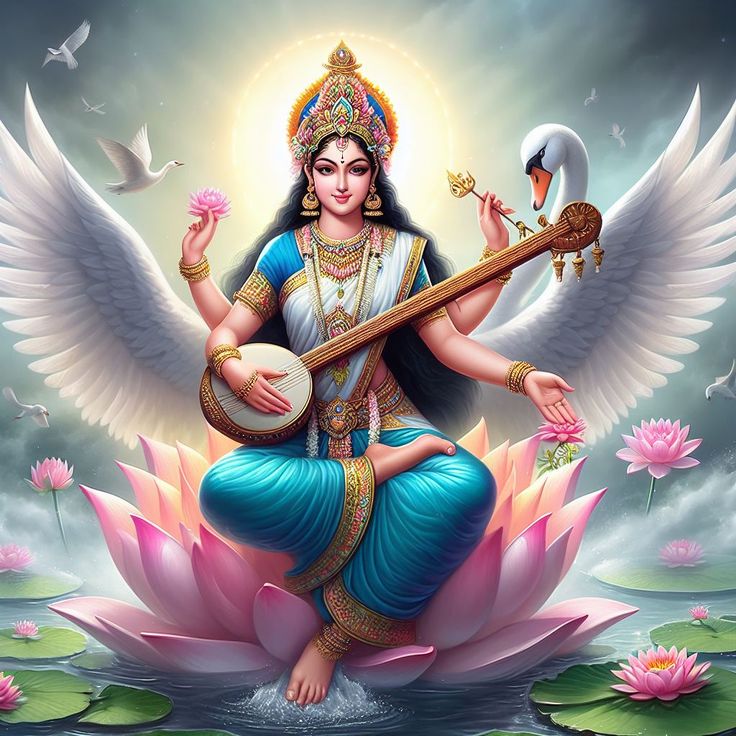
Saraswati and Retrieval of the Elixir of Life
The legendary stories about Saraswati also emphasize her essential part in the Soma, the elixir of life sought by the gods, recovering process. Saraswati came up with a cunning scheme to recover the priceless elixir after the Gandharvas, a group of celestial musicians, seized the Soma and guarded it with resentment.
Equipped with her enchanted musical ability on the veena, Saraswati visited the garden of the Gandharvas and enthralled them with her hypnotic tunes. Seizing the chance, she negotiated with the Gandharvas, offering to teach the heavenly skill of music in exchange for the Soma’s return. Captivated by Saraswati’s beauty and musical virtuosity, the Gandharvas quickly agreed; the goddess was able to recover the sought-after elixir, therefore guaranteeing the ongoing vitality of the celestial sphere.
Intervention by Saraswati during Crisis
Saraswati is also shown in the legendary stories as defender of the cosmic order, intervening during crises to shield the planet from approaching catastrophe. The gods went to Saraswati for aid when the demon, driven by his hard austerities, set out to rule the three planets. With her sharp intelligence and fast thinking, the goddess outwitted the demon so that his boon would finally bring about his doom.
Likewise, Saraswati emerged from a big river to quell the terrible fires when Shiva, the great destroyer, was aroused from his meditations and threatened to release his world-annihilating third eye. Her deeds not only helped to save the planet from certain catastrophe but also strengthened her responsibility as defender of the divine order, therefore preserving the equilibrium between creation and death.

Saraswati’s Dichotomy of Knowledge and Wealth
The mythological stories also look at the complicated link between Lakshmi, the goddess of wealth and prosperity, and Saraswati, the goddess of knowledge. Brahma debated the two goddesses as he realized he needed intellect as well as physical resources if he were trying to preserve the cosmic order.
While Saraswati said education might offer actual significance and fulfillment, Lakshmi contended that wealth was necessary for maintaining life. In the end, Brahma underlined that the well-being of the cosmos depended on a harmonic balance between the search of knowledge and the management of material resources since Brahma admitted the complementary character of these two divine characteristics.
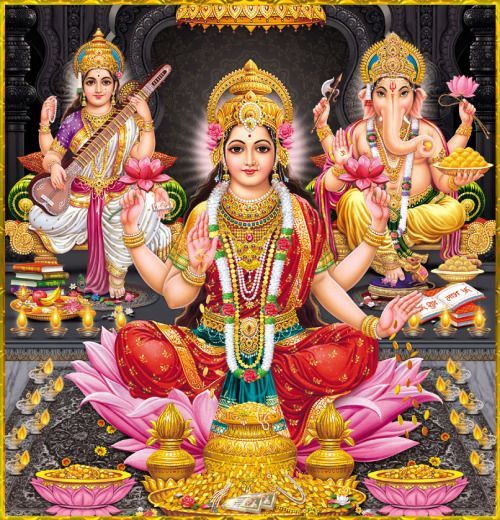
The Hindu Pantheon’s Saraswati’s Attendance
Saraswati is venerated and worshipped throughout many cultural and geographical borders, so her impact goes well beyond the boundaries of Hindu mythology. Saraswati’s presence is evidence of the universality of her divine qualities and the ageless attraction of her wisdom and artistic ability in nations including Myanmar, where she is known as Thurathadi, and Japan, where she is identified with the goddess Benzaiten.
Saraswati Puja Celebrated
The annual Saraswati Puja, performed on the fifth day of the lunar month of Magha (typically falling in late January or early February), clearly shows the respect for Saraswati. The goddess is worshipped at this lucky event, which is observed in households all throughout India and the Hindu diaspora as well as in educational institutions and cultural groups with grand celebrations and rituals.
Seeking her blessings for the acquisition of knowledge, the flowering of the arts, and the general well-being of their activities, devotees present flowers, incense, and other symbolic offerings to the goddess during Saraswati Puja. The festivities usually feature the performance of cultural events, the chanting of holy hymns, and the sharing of prasad—sanctified offerings—to the society.
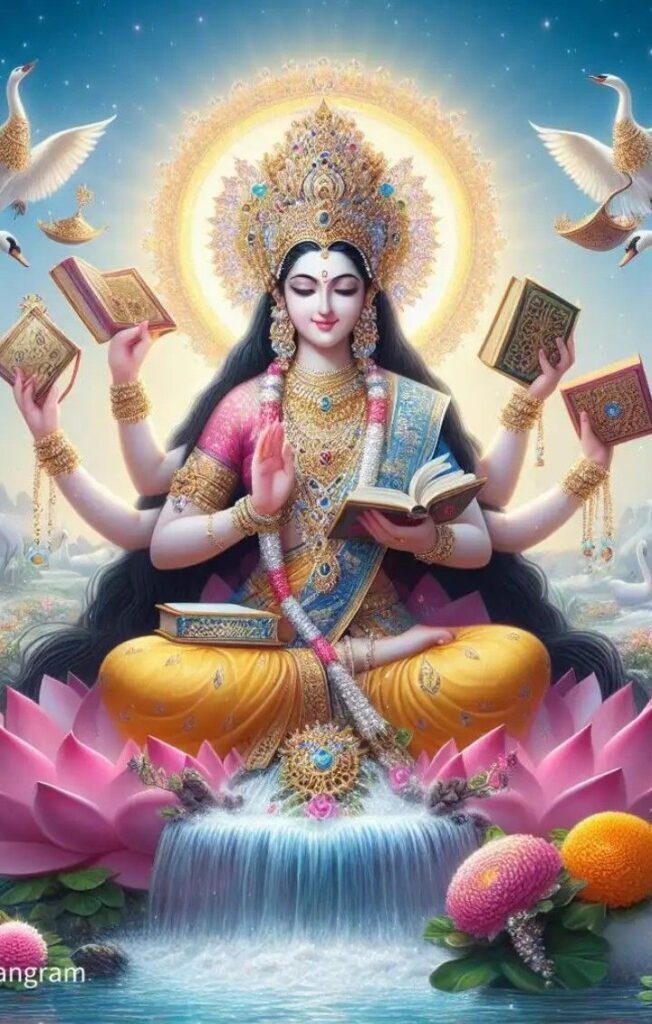
Saraswati’s Ongoing Legacy
Along with highlighting Saraswati’s celestial qualities, the mythological stories about her confirm her ongoing importance in the Hindu faith. From the holy books to the dynamic artistic manifestations that have enthralled audiences all around, Saraswati’s impact has permeated every aspect of Indian society as the living example of knowledge, wisdom, and the arts.
Saraswati’s relevance is still felt in the present era as her image and symbols are welcomed by educational institutions, cultural groups, and people trying to develop a closer relationship with knowledge and the polish of the human spirit. The goddess’s legacy is still very important and natural in the Hindu spiritual and cultural scene thanks to the annual Saraswati Puja festival and continuous respect for her divine personas.
Conclusion
The legendary stories about Saraswati, the Hindu goddess of knowledge, wisdom, and the arts, provide a rich and multifarious picture of her divine character. From her central part in the weave of the universe to her involvement in times of crisis, Saraswati’s impact has been woven into the very fabric of Indian spirituality and culture. Her annual celebration of Saraswati Puja and her ongoing respect across many geographical and cultural boundaries attest to the timeless relevance of her divine qualities and the great influence she has had on the spiritual and intellectual development of the Indian subcontinence.
#maasaraswati #maa #saraswati #god #hindu #Mythology

